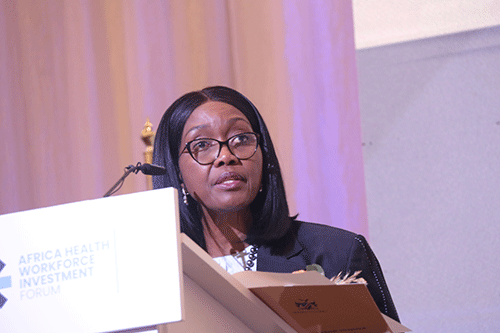The plight of healthcare workers, ranging from long working hours to burnout and the dilapidated state of some health facilities, has left government officials with sleepless nights.
The situation, Prime Minister (PM) Saara Kuugongelwa-Amadhila said, also compromises the provision of quality, affordable services.
As such, the PM said ensuring that healthcare workers are taken care of cannot be overemphasised.
“It is thus important to ensure that governments make the necessary investments not only in the public health systems overall, but specific attention must be given to strengthening the health workforce. Without a well-resourced health workforce, there can be no effective and high-quality healthcare services,” Kuugongelwa-Amadhila said.
The PM was addressing the opening ceremony for the inaugural World Health Organisation (WHO) Africa Health Workforce Investment forum in the capital yesterday.
She added that for health professionals to execute their mandate, they must be resourced and capacitated in the best ways possible.
“The remuneration packages in many public health services are not able to compete with the packages in the private sector. As a result, public healthcare services bleed heavily, as professionals depart for perceived greener pastures. On top of that, the perceived greener pastures are not at home; they are found thousands of miles on other continents,” the former finance minister said.
In addition, she said investments in the African health workforce must aim at building capacity.
“It is now more common than not to encounter patients who have experienced less than adequate services at the hands of some healthcare workers. There is a need, therefore, to promote greater motivation and sense of duty in our healthcare workers,” said the seasoned technocrat and politician.
On the day, health minister Dr Kalumbi Shangula said Africa faces numerous health workforce challenges, ranging from shortages of trained professionals to issues of retention and distribution.
“Many healthcare workers experience burnout due to long working hours, and the sheer disproportionate numbers of patients and clients they must attend to in their daily work. These challenges make it difficult for public health systems on the continent to provide responsive, comprehensive and high-quality healthcare to all citizens, particularly in remote and underserved areas within the ethos of universal health coverage,” Shangula said.
Echoing the PM’s sentiment, Shangula said the number of Africans who have left the continent in search of greener pastures is staggering.
“It is a matter that needs to be addressed as a top priority for African governments, and indeed all those who wish to see a shift in historical as well as current trends.
The Africa Centres for Disease Control and Prevention Director General Jean Kaseya said the public health workforce shortage in Africa stems from several factors, including underfunding of the health system by member states.
Kaseya added that inadequate training capacity, poor remuneration of health workers, rapid population growth, international unchecked labour migration, weak governance of the health workforce, a lack of career paths and poor retention decimate the African healthcare workforce.



